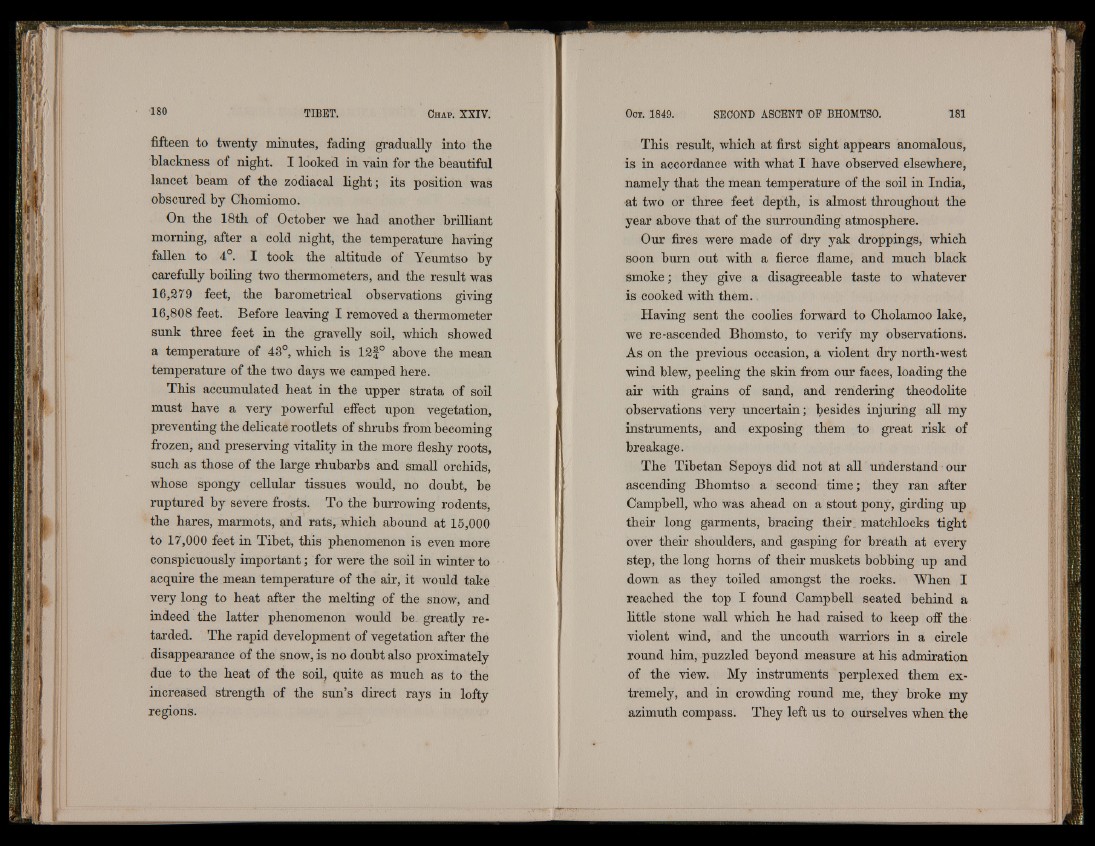
fifteen to twenty minutes, fading gradually into the
blackness of night. I looked in vain for the beautiful
lancet beam of the zodiacal lig h t; its position was
obscured by Chomiomo.
On the 18th of October we had another brilliant
morning, after a cold night, the temperature having
fallen to 4°. I took the altitude of Yeumtso by
carefully boiling two thermometers, and the result was
16,279 feet, the barometrical observations giving
16,808 feet. Before leaving I removed a thermometer
sunk three feet in the gravelly soil, which showed
a temperature of 43°, which is 12|° above the mean
temperature of the two days we camped here.
This accumulated heat in the upper strata of soil
must have a very powerful effect upon vegetation,
preventing the delicate rootlets of shrubs from becoming
frozen, and preserving vitality in the more fleshy roots,
such as those of the large rhubarbs and small orchids,
whose spongy cellular tissues would, no doubt, be
ruptured by severe frosts. To the burrowing rodents,
the hares, marmots, and rats, which abound at 15,000
to 17,000 feet in Tibet, this phenomenon is even more
conspicuously important; for were the soil in winter to
acquire the mean temperature of the air, it would take
very long to heat after the melting of the snow, and
indeed the latter phenomenon would be. greatly retarded.
The rapid development of vegetation after the
disappearance of the snow, is no doubt also proximately
due to the heat of the soil, quite as much as to the
increased strength of the sun’s direct rays in lofty
regions.
This result, which at first sight appears anomalous,
is in accordance with what I have observed elsewhere,
namely that the mean temperature of the soil in India,
at two or three feet depth, is almost throughout the
year above that of the surrounding atmosphere.
Our fires were made of dry yak droppings, which
soon burn out with a fierce flame, and much black
smoke; they give a disagreeable taste to whatever
is cooked with them.,
Having sent the coolies forward to Cholamoo lake,
we re-ascended Bhomsto, to verify my observations.
As on the previous occasion, a violent dry north-west
wind blew, peeling the skin from our faces, loading the
air with grains of sand, and rendering theodolite
observations very uncertain; besides injuring all my
instruments, and exposing them to great risk of
breakage.
The Tibetan Sepoys did not at all understand our
ascending Bhomtso a second time; they ran after
Campbell, who was ahead on a stout pony, girding up
their long garments, bracing their matchlocks tight
over their shoulders, and gasping for breath at every
step, the long horns of their muskets bobbing up and
down as they toiled amongst the rocks. When I
reached the top I found Campbell seated behind a
little stone wall which he had raised to keep off the
violent wind, and the uncouth warriors in a circle
round him, puzzled beyond measure at his admiration
of the view. My instruments perplexed them extremely,
and in crowding round me, they broke my
azimuth compass. They left us to ourselves when the